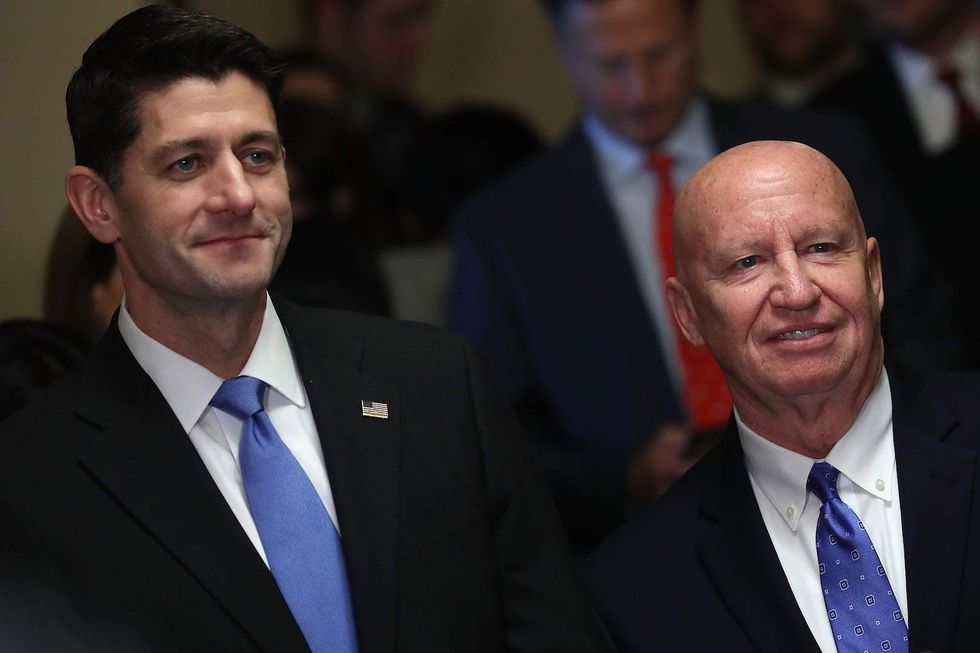The nation's biggest tax overhaul in decades cleared its final hurdle Wednesday in what's considered the Trump Administration's greatest win since taking office in January.
The House again passed the sweeping tax reform bill Wednesday in a 224-201 vote, and now it's finally headed to President Donald Trump's desk for his signature.
The Senate passed the final version of the Tax Cuts and Jobs Act just after midnight Wednesday morning, but it was sent back to the House for another vote because of some provisions deemed in violation of Senate rules, CBS News reported. Both chambers are required to adopt identical versions before the bill can be sent to the president.
Bloomberg reported that Trump could sign the bill as early as Wednesday afternoon.
President Donald Trump heralded the news of the final passage with a tweet declaring, "We are delivering HISTORIC TAX RELIEF for the American people!"
What's in the final bill for individuals and families?
There are currently seven tax rate tables for taxpayers ranging from 10 to 39.6 percent. Under the new bill, the rates will range from 10 to 37 percent, and the qualifying income for the bracket will also be adjusted. The highest rate kicks in for those with incomes above $418,401 for single-payers and $470,701 for married, joint-filers.
The standard deduction currently is $6,350 for singles and $12,700 for married, joint-filers. The bill will nearly double both to $12,000 for singles and $24,000 for married, joint-filers.
The Obamacare mandate will be repealed. Those who fail to buy health insurance will no longer be subject to a "tax" penalty.
The proposed law will also double the child tax credit to $2,000 per child and raise the phase-out threshold to $500,000. The bill would also preserve the adoption tax credit.
The mortgage interest deduction would change only for new homeowners, who would be allowed to deduct mortgage interest at a cap of $750,000 in mortgage debt, down from $1 million.
How will it help businesses?
The current corporate tax rate is set at 35 percent, but the new law will cut it to 21 percent.
The corporate alternative minimum tax would be completely repealed.
Currently, pass-through businesses pass income to their owners, who pay individual taxes on the income. The new law will allow for a 20 percent deduction on that income. Limits would begin at $315,000 for married, joint filers and half of that for single-filers.
What happened this week to get the bill passed?
On Tuesday, the House passed the tax bill that came out of the conference committee where lawmakers from both chambers struck a deal that appeared to clear the path for a Senate vote later the same day.
But before the Senate could put the legislation to a vote, three provisions had to be removed to satisfy Democrats who said the provisions violated procedural rules of the Senate.
The violations involved the use of 529 savings accounts for home-schooling expenses; a new endowment tax that exempted colleges with fewer than 500 students paying tuition; and the last objection was a technicality that the bill repeals a section of the tax code by its number, instead of the title of the section, according to CBS. Republicans allowed those provisions to be struck from the bill.
Because of these changes, the House was required to vote again Wednesday in order to pass the Senate language and send the bill to the president.
What are lawmakers saying about the tax reform bill?
"This bill will come back to haunt them, as Frankenstein did," House Minority Leader Nancy Pelosi (D-Calif.) said, Fortune reported.
"After eight straight years of slow growth, America is ready to take off," Senate Majority Leader Mitch McConnell (R-Ky.) told reporters after the Senate vote.
"Republican assertions that giant corporations newly flush with cash will, out of the goodness of their hearts, pass on their windfall to workers ignore both evidence and logic. It’s foolhardy at best and deceitful at worst," Sen. Cory Booker (D-N.J.) said in a statement.
"After years of work, we are going to enact the most sweeping, pro-growth overhaul of our tax code in a generation. Americans are going to see relief almost immediately in the form of bigger paychecks and lower taxes," Speaker of the House Paul Ryan (R-Wis.) said in a statement early Wednesday. "I commend Leader McConnell and Chairman [Orrin] Hatch for working closely with the House to produce this historic legislation, and I look forward to joining them to send it to the president."



